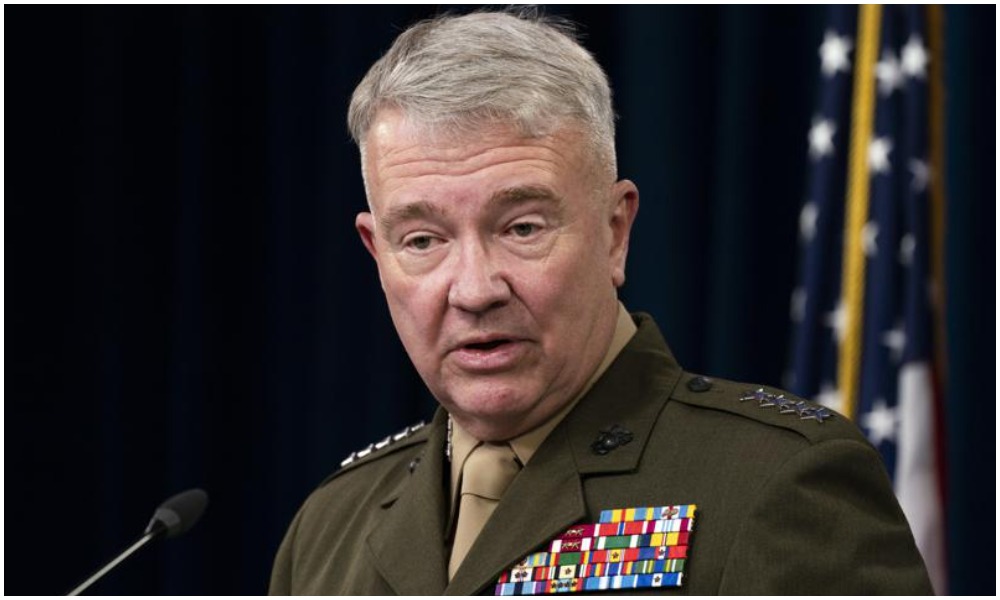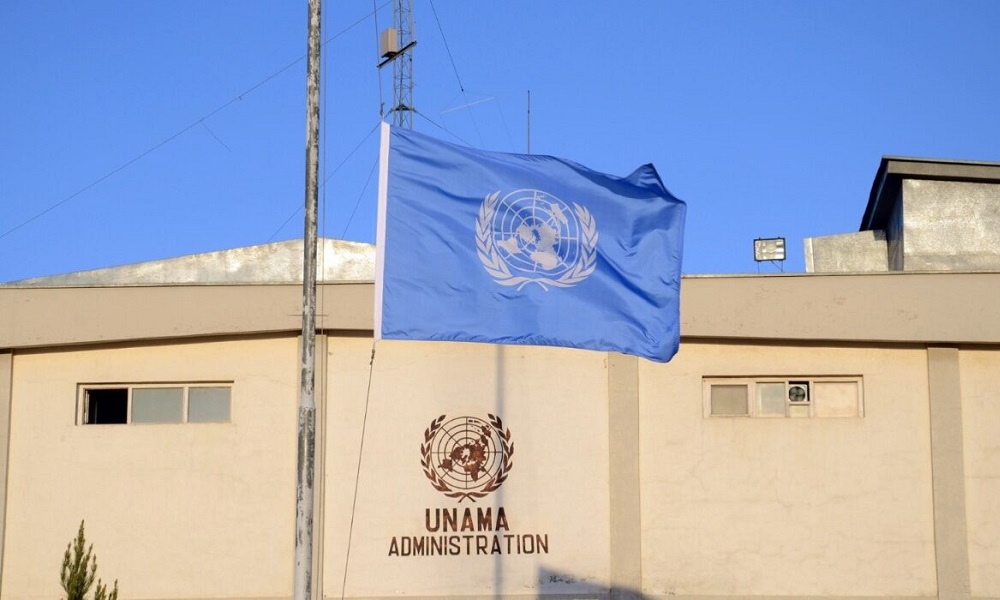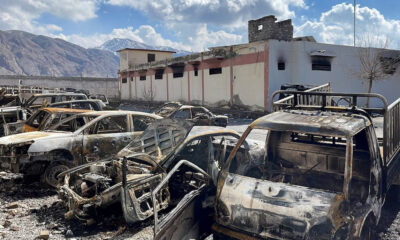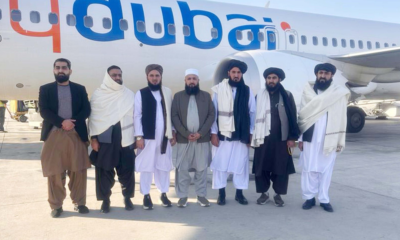Latest News
Gen McKenzie to recommend post-withdrawal plan for Afghanistan

General Frank McKenzie, the Middle East commander of US Central Command (CENTCOM) said Wednesday he will make recommendations to Defense Secretary Lloyd Austin in early June on how to monitor and fight terrorist groups in Afghanistan from beyond its borders after all American forces withdraw.
McKenzie said negotiations with Afghanistan’s neighbors for overflight rights and troop basing are “moving forward” but will take time.
As a result, he said, the way the United States keeps an eye on the terrorist threat and aids the Afghan military will evolve as agreements are reached or security conditions on the ground change, The Associated Press reported.
He cautioned that this will be a “taxing time” for the Afghan military and “the risk is high.”
Speaking to reporters from The Associated Press and ABC News traveling with him to the Middle East, McKenzie declined to provide details about the recommendations he will make to Austin.
He said he will also provide cost estimates for keeping surveillance aircraft over Afghanistan regularly enough to keep track of terrorist groups after the U.S. pullout is completed.
McKenzie has made it clear that without any bases in neighboring countries, it will require far more aircraft to keep watch over Afghanistan because they will have to fly for four hours to six hours from other U.S. military installations in the Middle East.
The flight distance severely limits the amount of time the aircraft can spend in the air over Afghanistan, AP reported.
Military leaders are grappling with how best to carry out President Joe Biden’s order to withdraw all American troops from Afghanistan by September while still providing support to the Afghan forces and monitoring the threat that prompted the U.S. invasion of the country after the attacks of September 11, 2001.
Commanders have said they will monitor threats from “over the horizon,” to ensure that terrorists cannot again use Afghanistan as a base to launch attacks against the U.S. But they have acknowledged that the U.S. does not yet have any agreements for basing or overflights from any of the neighboring countries.
McKenzie said he is confident the U.S. will get the access it needs. But as yet, there are no firm solutions or decisions.
At the same time, Pentagon leaders and Congress members have expressed concerns that once the U.S. leaves, the Afghan government and its military will be quickly overrun by the Taliban.
The Afghan military, particularly its air force, has been heavily dependent on the U.S. for maintenance and training, as well as for combat air support when its troops are under attack. McKenzie said he believes the Afghans have a “fighting chance” to be successful and defend themselves.
“It’s time for the Afghan military to stand up and show that they can fight alone,” said McKenzie.
“I think it’s going to be a very taxing time for them. I think certainly there is a path for them to preserve what they have now. The risk is high. I don’t want to minimize that.”
He said that while the Taliban have not been attacking the U.S. or coalition troops, the violence against the Afghan people and the country’s military forces has been very high.
U.S. lawmakers have said they believe there is no chance the Taliban will abide by the commitments their leaders made in a February 2020 agreement with the Trump administration, which included engaging in sustained peace negotiations and severing all forms of cooperation with and support for al-Qaeda. Members of Congress also worry that al-Qaeda and the Islamic State group (Daesh) will take advantage of the chaos and regroup, with a goal of attacking the U.S. again.
McKenzie said that both al-Qaeda and IS have been degraded, AP reported.
“Our concern would be that ungoverned spaces open in Afghanistan and they are able to reassert themselves,” he said. “This would not be immediate. I don’t think anybody (thinks) this is something that will happen next month or even in the next six months. But eventually they will gather their strength again and they’ll be a threat to our homeland.”
Washington’s special envoy to Afghanistan, Zalmay Khalilzad, told a House hearing Tuesday that it is unduly pessimistic to predict that the Kabul government or Afghan military will be quickly overrun by the Taliban once U.S. and coalition forces withdraw.
He said the Taliban have reason not to push for a military victory and instead pursue a negotiated political settlement that could give them international legitimacy and removal from certain American and United Nations sanctions. He recently met with Taliban representatives in Doha, Qatar, as part of a round of consultations with interested parties.
Latest News
Tajik foreign minister urges international community to help Afghanistan address its challenges

Tajikistan’s Minister of Foreign Affairs, Sirodjiddin Mukhriddin, has called on the international community to step up assistance for Afghanistan as the country continues to face challenges.
Speaking at a press conference, Mukhriddin said Tajikistan and Afghanistan maintain active coordination between their law enforcement agencies to prevent security incidents along their shared border. He noted that this cooperation remains essential, as the frequency of armed attacks and criminal activity in border regions has increased in recent months.
He said that Afghan authorities had assured Tajikistan they would take necessary measures to stop further incidents and would conduct thorough investigations into any violations.
Mukhriddin emphasized that Tajikistan supports constructive international engagement aimed at improving Afghanistan’s socio-economic conditions. He highlighted that Tajikistan has provided more than 6,000 tons of humanitarian aid to Afghanistan, including food and essential supplies delivered in 2025 to assist communities affected by devastating earthquakes.
The minister also pointed to growing economic cooperation between the two neighbors. Tajikistan has reopened border markets and continues to supply electricity to Afghanistan.
Tajikistan and Afghanistan share a border of more than 1,300 kilometers—over 1,100 km of which consists of waterways and about 190 km of land boundaries.
Meanwhile, Zafar Samad Director of the Drug Control Agency under the President of the Republic of Tajikistan, has said that last year, 17 incidents of clashes happened with drug smugglers along the border with Afghanistan. As a result, two Tajik forces and 10 Afghan nationals have been killed, he added.
Latest News
Baradar: Afghanistan is not an easy target, but a ‘bitter tree’

Mullah Abdul Ghani Baradar, Deputy Prime Minister for Economic Affairs, warned during a graduation ceremony for soldiers of the Ministry of National Defense that the Islamic Emirate will respond decisively to anyone with ill intentions toward Afghanistan.
He said the country is “not an easy target, but a bitter tree that has made the throats of empires bitter and newborns can never digest.”
Baradar also announced that in the coming days, the Islamic Emirate will introduce tax exemptions of one to five years for domestic and foreign investors, based on the level of investment in new sectors. He also said that the process of distribution of land to manufacturers will be accelerated.
Baradar called on countries to engage in political and economic relations according to the values and principles of the Islamic Emirate, emphasizing that energy and resources spent on conflict would be better used to support one another and strengthen common interests.
Latest News
Fourteen former Afghan government forces killed in last three months of 2025: UNAMA

The United Nations Assistance Mission in Afghanistan (UNAMA), in its latest report on the human rights situation in Afghanistan, stated that 14 members of the former Afghan government forces were killed in the last three months of 2025.
The report noted that during this period, there were 28 cases of arbitrary arrest and detention, and at least seven cases of torture and ill-treatment targeting officials and personnel of the former Afghan government.
According to the report, some of the officials and forces who had recently returned to Afghanistan from Iran and Pakistan were among those subjected to extrajudicial killings, arbitrary arrests, and detentions.
The report also highlighted restrictions on women’s work and movement, executions and flogging of individuals, and disruptions to internet and telecommunications services.
-

 Sport5 days ago
Sport5 days agoHosts and heavyweights advance as AFC Futsal Asian Cup reaches semifinals
-

 Latest News4 days ago
Latest News4 days agoTerrorist threat in Afghanistan must be taken seriously, China tells UNSC
-

 Latest News5 days ago
Latest News5 days agoUzbekistan, Pakistan advance Trans-Afghan railway project
-

 Sport5 days ago
Sport5 days agoWinter Olympics finally underway, ATN to broadcast exclusively across Afghanistan
-

 Latest News2 days ago
Latest News2 days agoAfghanistan to grant one- to ten-year residency to foreign investors
-

 Sport4 days ago
Sport4 days agoAfghanistan beat West Indies in final T20 WC warm-up match
-

 Sport3 days ago
Sport3 days agoIndonesia shock Japan to reach historic AFC Futsal Asian Cup final
-

 Regional5 days ago
Regional5 days agoPakistan sends helicopters, drones to end desert standoff; 58 dead
























